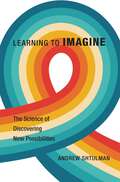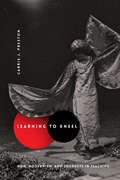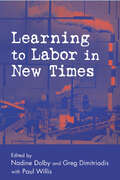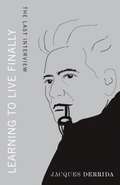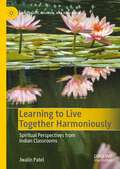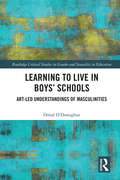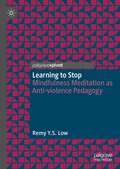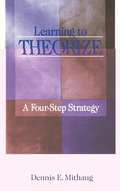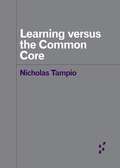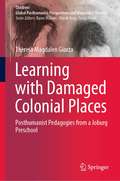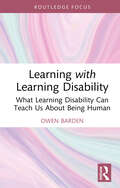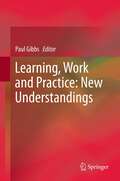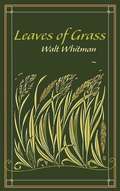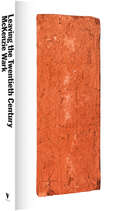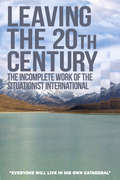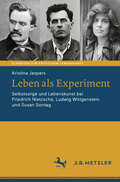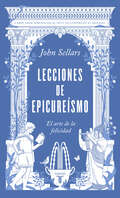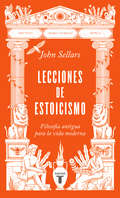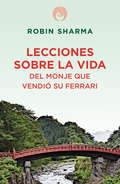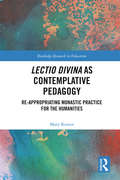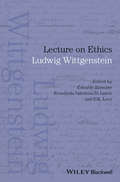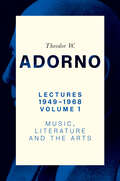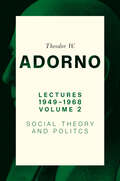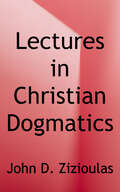- Table View
- List View
Learning to Imagine: The Science Of Discovering New Possibilities
by Andrew ShtulmanAn award-winning cognitive scientist offers a counterintuitive guide to cultivating imagination.Imagination is commonly thought to be the special province of youth—the natural companion of free play and the unrestrained vistas of childhood. Then come the deadening routines and stifling regimentation of the adult world, dulling our imaginative powers. In fact, Andrew Shtulman argues, the opposite is true. Imagination is not something we inherit at birth, nor does it diminish with age. Instead, imagination grows as we do, through education and reflection.The science of cognitive development shows that young children are wired to be imitators. When confronted with novel challenges, they struggle to think outside the box, and their creativity is rigidly constrained by what they deem probable, typical, or normal. Of course, children love to “play pretend,” but they are far more likely to simulate real life than to invent fantasy worlds of their own. And they generally prefer the mundane and the tried-and-true to the fanciful or the whimsical.Children’s imaginations are not yet fully formed because they necessarily lack knowledge, and it is precisely knowledge of what is real that provides a foundation for contemplating what might be possible. The more we know, the farther our imaginations can roam. As Learning to Imagine demonstrates, the key to expanding the imagination is not forgetting what you know but learning something new. By building upon the examples of creative minds across diverse fields, from mathematics to religion, we can consciously develop our capacities for innovation and imagination at any age.
Learning to Kneel: Noh, Modernism, and Journeys in Teaching (Modernist Latitudes)
by Carrie J. PrestonIn this inventive mix of criticism, scholarship, and personal reflection, Carrie J. Preston explores the nature of cross-cultural teaching, learning, and performance. Throughout the twentieth century, Japanese noh was a major creative catalyst for American and European writers, dancers, and composers. The noh theater’s stylized choreography, poetic chant, spectacular costumes and masks, and engagement with history inspired Western artists as they reimagined new approaches to tradition and form. In Learning to Kneel, Preston locates noh’s important influence on such canonical figures as Pound, Yeats, Brecht, Britten, and Beckett. These writers learned about noh from an international cast of collaborators, and Preston traces the ways in which Japanese and Western artists influenced one another.Preston’s critical work was profoundly shaped by her own training in noh performance technique under a professional actor in Tokyo, who taught her to kneel, bow, chant, and submit to the teachings of a conservative tradition. This encounter challenged Preston’s assumptions about effective teaching, particularly her inclinations to emphasize Western ideas of innovation and subversion and to overlook the complex ranges of agency experienced by teachers and students. It also inspired new perspectives regarding the generative relationship between Western writers and Japanese performers. Pound, Yeats, Brecht, and others are often criticized for their orientalist tendencies and misappropriation of noh, but Preston’s analysis and her journey reflect a more nuanced understanding of cultural exchange.
Learning to Kneel: Noh, Modernism, and Journeys in Teaching (Modernist Latitudes)
by Carrie J. PrestonIn this inventive mix of criticism, scholarship, and personal reflection, Carrie J. Preston explores the nature of cross-cultural teaching, learning, and performance. Throughout the twentieth century, Japanese noh was a major creative catalyst for American and European writers, dancers, and composers. The noh theater's stylized choreography, poetic chant, spectacular costumes and masks, and engagement with history inspired Western artists as they reimagined new approaches to tradition and form. In Learning to Kneel, Preston locates noh's important influence on such canonical figures as Pound, Yeats, Brecht, Britten, and Beckett. These writers learned about noh from an international cast of collaborators, and Preston traces the ways in which Japanese and Western artists influenced one another. Preston's critical work was profoundly shaped by her own training in noh performance technique under a professional actor in Tokyo, who taught her to kneel, bow, chant, and submit to the teachings of a conservative tradition. This encounter challenged Preston's assumptions about effective teaching, particularly her inclinations to emphasize Western ideas of innovation and subversion and to overlook the complex ranges of agency experienced by teachers and students. It also inspired new perspectives regarding the generative relationship between Western writers and Japanese performers. Pound, Yeats, Brecht, and others are often criticized for their orientalist tendencies and misappropriation of noh, but Preston's analysis and her journey reflect a more nuanced understanding of cultural exchange.
Learning to Labor in New Times (Critical Social Thought)
by Paul Willis Nadine Dolby Greg DimitriadisLearning to Labor in New Times foregrounds nine essays which re-examine the work of noted sociologist Paul Willis, 25 years after the publication of his seminal Learning to Labor, one of the most frequently cited and assigned texts in the cultural studies and social foundations of education.
Learning to Live Finally: The Last Interview
by Jacques Derrida Jean Birnbaum Pascal-Anne BraultWith death looming, Jacques Derrida, the world's most famous philosopher--known as the father of "deconstruction"--sat down with journalist Jean Birnbaum of the French daily Le Monde. They revisited his life's work and his impending death in a long, surprisingly accessible, and moving final interview. Sometimes called "obscure" and branded "abstruse" by his critics, the Derrida found in this book is open and engaging, reflecting on a long career challenging important tenets of European philosophy from Plato to Marx. The contemporary meaning of Derrida's work is also examined, including a discussion of his many political activities. But, as Derrida says, "To philosophize is to learn to die"; as such, this philosophical discussion turns to the realities of his imminent death--including life with a fatal cancer. In the end, this interview remains a touching final look at a long and distinguished career.
Learning to Live Together Harmoniously: Spiritual Perspectives from Indian Classrooms (Spirituality, Religion, and Education)
by Jwalin PatelThis book calls for an expanded vision of holistic education that emphasizes togetherness and harmony through the discovery of oneself, others, and the larger society. It brings together teachers’ voices, experiences, and practices for such an education with Southern Knowledge, philosophy and ideologies proposed by Indian philosophers and spiritual leaders like Aurobindo, the Dalai Lama, Gandhi, Krishnamurti, and Tagore. The book reconceptualizes and extends UNESCO's "Learning To Live Together" to emphasize "Learning to Live Together Harmoniously" (LTLTH) and develops a novel conceptual framework for it. The book also explores how LTLTH can be translated into practice; calling for a continuum of harmonious lived experiences created through experiential and project based pedagogy, systems and processes for autonomy and autonomous behaviour regulation, empathetic teacher student relations, schoolwide ethos of harmonious living, and teachers’ ways of living and being.
Learning to Live in Boys’ Schools: Art-led Understandings of Masculinities (Routledge Critical Studies in Gender and Sexuality in Education)
by Donal O'DonoghueThis book is about boys’ experiences of being educated in independent single-sex schools in Canada. These experiences, which are oftentimes attributed to particular places and moments at school, reveal ways in which school places are both "companionable" and "influential" in how boys become available to themselves and others as they pursue the possibility of becoming somebody. Curious about how masculinities show up in places at school and studying the sorts of gendered subjectivities that such places invite, entice, support and deny, the book extends beyond traditional ways of thinking and writing about the production of masculinities in education by introducing a different set of conceptual orientations and inquiry practices, including post-masculinities, weak theory, and art-led research and thought practices.
Learning to Stop: Mindfulness Meditation as Anti-violence Pedagogy
by Remy Y.S. LowThis book is a philosophical and historical study that explores how meditative practices for cultivating mindfulness can be regarded as a unique form of education against violence—one that emphasizes stopping and contemplation as a necessary precursor to action. It brings together the idiosyncratic but insightful musings on violence by Slovenian philosopher Slavoj Žižek with recent research on mindfulness and violence as a lens. Using this lens, it looks at two exemplary educators and how they taught mindfulness meditation as a way of resisting the types of violence they and their students faced: the Vietnamese Zen teacher Thich Nhat Hanh amidst the brutality of the Second Indochina War (1955-1975), and the African-American studies professor and cultural critic bell hooks in the face of systemic oppression in the United States of the 1980s.
Learning to Theorize: A Four-Step Strategy
by Dennis E. Mithaughow to separate the facts, value and actions of a situation to clarify and understand their relationship and how a thinking strategy assists in learning to theorize better
Learning versus the Common Core (Forerunners: Ideas First #55)
by Nicholas TampioAn open challenge to Common Core&’s drive for uniformity Nicholas Tampio watched as his kindergartner&’s class shifted from one where teachers, aides, parents, and students worked hard to create a rewarding educational experience to one in which teachers delivered hours-long lectures using packaged lesson plans. Learning versus the Common Core explains how standards-based education reform is transforming nearly every aspect of public education by looking closely at the standards, the agenda of people pushing standards-based reform, and how these fit within a global pattern of education reform. With a nod to the philosophy of John Dewey, Tampio concludes with a vision of what democratic education can look like today—and how people can form rhizomatic alliances across different political and ethical backgrounds to fight the Common Core.Forerunners: Ideas First Short books of thought-in-process scholarship, where intense analysis, questioning, and speculation take the lead
Learning with Damaged Colonial Places: Posthumanist Pedagogies from a Joburg Preschool (Children: Global Posthumanist Perspectives and Materialist Theories)
by Theresa Magdalen GiorzaThis book offers a close and detailed account of the emergent and creative pedagogies of children learning together in a small, not-for-profit preschool, and the entangled becomings of their carers as well as the researcher–artist–author. The mutually affecting and inseparable realities of the ‘material’ and the ‘discursive’ are made visible through lively and sensual pedagogical invention by a group of five-year olds in the inner-city preschool which is located in Johannesburg, South Africa. These small, local stories are recognized in their emergence with global geopolitical realities. The author makes a valuable contribution to post-qualitative research through the use of visual research methods and non-representational approaches to working with knowledge. The book draws on the constantly evolving practices of Philosophy for Children (P4C) and Reggio Emilia both as pedagogical tools and as research methods. Photographs and stills from video footage provide a sense of the relatively modest material environment of the school. The book celebrates the considerable richness of the involvement of the children and the enormous possibilities offered by the world both inside and outside of the classroom when an enquiry-led art-based pedagogy is followed. Drawings and other products created by the children in the study offer valuable insight into the depth and complexity of their engagement with their worlds, both individual and collaborative.
Learning with Learning Disability: What Learning Disability Can Teach Us About Being Human (Autocritical Disability Studies)
by Owen BardenThis book uses the concept of “learning disability” to explore what it means to be human. It argues that we need to learn with rather than from or about learning disability. This crucial distinction means being open to what learning disability can teach us about what it means to be human. This approach comes from recognising learning disability as an organising concept – a concept which radically transforms our sense of what it means to be – or not be – a person.After reflecting on the author’s relationship to learning disability, the book explores relationships and tensions between conceptualisations of learning disability and of the human. Through historical ontology, the book initially examines how the phenomenon of “learning disability” came into being. It then explores ways in which the concept of learning disability has, over the course of the 20th and 21st centuries, radically transformed our sense not only of education and learning, but also of who is or is not deemed entitled to full citizenship and the associated rights, and so who is or is not fully human. Each chapter of the book exposes tensions and contradictions apparent in the ways we tend to think about personhood and learning disability, illuminating them through a series a binary oppositions: human and not fully human; menacing and vulnerable; controlled and abandoned; capable and incapable; human and posthuman.The book concludes by drawing together these tensions and contradictions to challenge the prevailing metanarrative of disability and make the case for a more inclusive conceptualisation of what it means to be human.It will be of interest to all scholars and students of disability studies, the history of learning disability, humanism and posthumanism, and learning disability advocacy.
Learning, Work and Practice: New Understandings
by Paul GibbsThis book's original contribution to a crowded literature on work and learning will attract strong international interest. Its focus on the philosophy of learning at work brings a fresh perspective on a topic normally viewed through psychological, anthropological and sociological eyes. It assembles a host of internationally recognized scholars who reflect on the various philosophies of work-based learning. Full of distinctive and original contributions that provide perceptive insights into the subject, the work will be a practical support to teachers, trainers and researchers at the same time as it gives readers a clear philosophical grounding in learning at work. It is, however, not simply a book about philosophy, but a gazetteer of approaches to education in work that will sustain and inspire those who provide, engage in, and support the learning of new knowledge and skills in the workplace. With adaptability to new employment opportunities so vital to existing workers, the authors stand behind continued provision of work-based learning in the face of tightening economic constraints.
Leaves of Grass: The Original 1855 Edition (Leather-bound Classics #Vol. No. 9)
by Walt Whitman Kenneth C. MondscheinA timeless collection of hundreds of poems that resonate to the American spirit. Leaves of Grass is a timeless collection of poems and essays penned by influential nineteenth-century writer Walt Whitman. This profound compilation explores topics such as nature, mysticism, mortality, transcendentalism, and democracy. Inspired by personal experiences and observations, Whitman spent almost four decades piecing together the complete work, sharing societal ideals and epiphanies about life that still resonate with readers today. This edition of the complete Leaves of Grass also includes Whitman’s preface to the original 1855 edition, in which he expounds on his personal philosophy of writing poetry, and an introduction by scholar Kenneth C. Mondschein.
Leaving The Twentieth Century: Situationist Revolutions
by McKenzie WarkThe acclaimed history of the groundbreaking Situationist movementThe Situationist International, which leaped to the fore during the Paris tumult of 1968, has extended its revolutionary influence right up to the present day. In Leaving the Twentieth Century, the movement is captured for the first time in its full range and diversity.McKenzie Wark traces the group&’s development from the bohemian Paris of the &’50s to the explosive days of May &’68. She introduces the group as an ensemble, revealing the work and activities of thinkers previously obscured by the reputation of founding member Guy Debord. Roaming through Europe and exploring the vital lives its members—including Constant, Asger Jorn, Michèle Bernstein, Alexander Trocchi, and Jacqueline de Jong—Wark uncovers a group riven with conflicting passions. She follows the narrative beyond 1968, to the Situationists International&’s disintegration and beyond: the ideas of T. J. Clark, the Fourierist utopia of Raoul Vaneigem, René Vienet&’s earthy situationist cinema, Gianfranco Sanguinetti&’s pranking of the Italian ruling class, Alice Becker-Ho&’s account of the anonymous language of the Romany, and Debord&’s late films and his surprising work as a game designer.
Leaving the 20th Century: The Incomplete Work of the Situationist International
by Christopher GrayThe first Situationist text to be published in the UK in 1974, 'Leaving the 20th Century' was Chris Gray and the English situationists' attempt to capture and distil the vibrant anti-art, anti-capitalist energy of the original International Situationist texts (1957-74). With its loose translations and irreverent commentary, Gray and co. attempted to capture the "terrorism, wit and general megalomania" of the original publications, whilst faithfully reprinting the "photographs of girls, soldiers, bombings, comic-strip frames, maps of cities and diagrams of labyrinths, cathedrals and gardens." From the art/anti-art beginnings, to the role of the Situationists in the worker-student insurrection of May 68', 'Leaving the 20th Century' remains the definitive English pro-situ text.
Leben als Experiment: Selbstsorge und Lebenskunst bei Friedrich Nietzsche, Ludwig Wittgenstein und Susan Sontag (Schriften zur Kritischen Lebenskunst)
by Kristina JaspersFriedrich Nietzsche, Ludwig Wittgenstein und Susan Sontag beschäftigten sich intensiv mit Fragen der Selbstsorge und Lebenskunst – teils im direkten Bezug aufeinander. So sah Wittgenstein in Nietzsche ein Vorbild in Fragen der Stilistik und Introspektion; Sontag wollte Wittgenstein in der Konsequenz seiner Lebensentscheidungen folgen und Nietzsche in seinem Selbstbewusstsein sowie in seiner radikalen Selbstkritik. Diese Arbeit untersucht drei Experimentierfelder, auf denen Nietzsche, Wittgenstein und Sontag sich erprobt haben und macht diese für heute fruchtbar: Ortswechsel dienen der Veränderung des äußeren Umfelds, der Suche nach neuen Anregungen oder dem Rückzug in eine ihnen gemäße Umgebung. Die Beschäftigung mit Gesundheit und Krankheit betrifft ihre psychische wie physische Verfasstheit und schließt mentale Übungen ein. In der künstlerischen Praxis suchen alle drei neue Erfahrungen, ein anderes Selbsterleben sowie Ausdrucksmöglichkeiten jenseits der Sprache.
Lecciones de epicureísmo: El arte de la felicidad
by John SellarsFilosofía antigua y mediterránea para la vida moderna. Un antídoto epicúreo para la ansiedad. ¿Cómo vivir una vida feliz? Hace más de dos mil años, el filósofo griego Epicuro ofreció una respuesta simple: lo único que realmente necesitamos es placer. Hoy tendemos a asociar la palabra «epicúreo» con el exceso indulgente y el simple disfrute de la comida y el vino, pero el hedonismo ligero y la autocomplacencia decadente están a años luz de la vida placentera que perseguían Epicuro y sus seguidores, más preocupados por los placeres mentales y por eludir el dolor incluso en los tiempos difíciles. Su objetivo, en definitiva, era una existencia de tranquilidad y satisfacción. En este libro elegante y original John Sellars nos lleva a través de la historia del epicureísmo, desde un jardín privado en las afueras de la antigua Atenas, donde Epicuro y sus estudiantes vivieron en el siglo IV a. C. y lasmujeres eran tan bienvenidas como los hombres, hasta Roma, donde la influencia epicúrea floreció gracias al poeta Lucrecio y su cohorte. Sellars propone una manera constructiva de repensar nuestro lugar en el mundo, y nos muestra cómo esta doctrina puede ayudarnos a valorar la importancia de la alegría, la naturaleza y el simple hecho estar vivos. Reseñas: «No solo una excelente introducción a la historia de la filosofía epicúrea, sino también una guía útil para afrontar las múltiples ansiedades de la vida moderna.» The Idler «Lúcido y repleto de sabiduría.» The Daily Telegraph «Sellars expone con pericia las ideas epicúreas, en particular sobre la amistad y el dolor, y está íntimamente familiarizado con los textos epicúreos griegos y latinos. El epicureísmo puede aliviar las preocupaciones contemporáneas, defiende Sellars. Se parece a la terapia cognitivo-conductual.» The Guardian «En este libro breve y elocuente, John Sellars nos lleva a través de los argumentos básicos del epicureísmo con una claridad maravillosa, destilando la esencia de una filosofía antigua que habla con creciente urgencia de nuestros tiempos convulsos. Es una guía ejemplar y la recomiendo con entusiasmo a lectores de todas las edades y condiciones sociales.» DAVID KONSTAN, Universidad de Nueva York
Lecciones de estoicismo
by John Sellars¿Qué nos enseñan los estoicos sobre cómo vivir? Un libro elegante y profundamente reconfortante que muestra por qué el estoicismo es la filosofía de nuestro tiempo. En los últimos tiempos se habla mucho de esta corriente, pero ¿cómo pensaban realmente sus miembros? John Sellars destila y entrelaza las ideas clave de los tres grandes estoicos romanos (Séneca, Epicteto y Marco Aurelio) ofreciendo también instantáneas de sus fascinantes vidas. Las obras de estos tres grandes tratan fundamentalmente sobre cómo vivir: entender nuestro lugar en el mundo, afrontar las adversidades, hacer un mejor uso del tiempo, controlar nuestras emociones y orientarnos en nuestras relaciones con los demás. Sus ideas pueden, en definitiva, guiarnos en nuestra búsqueda de una existencia más placentera. La crítica ha dicho:«Accesible y absorbente. Sellars es un escritor claramente comprometido con la misión de volver la filosofía clásica relevante hoy.»Roger Cox, The Scotsman «Un logro admirable. En una prosa elegante y concisa, nos insta a convertirnos en personas mejores y más felices centrándonos en la toma racional de decisiones.»Tim Whitmarsh, The Guardian «Un estudio conciso pero muy autorizado de la filosofía estoica dirigido a cualquier lector. Presenta el estoicismo de una manera accesible, pero se basa en muchos años de trabajo académico.»Donald Robertson, Medium «Una obra con muchas ventajas frente a otras del mismo género. Cubrir tanto terreno sin limitarse a lo superficial requiere una verdadera habilidad como escritor y como profesor.»Nigel Warburton, Five Books «No suelo leer filosofía, pero después de terminar este libro estoy convencida de que el viejo Séneca tenía razón.»Liz Jones, Mail on Sunday
Lecciones sobre la vida del monje que vendió su Ferrari
by Robin Sharma«Cuando naciste, llorabas mientras el mundo se regocijaba. Vive la vida de manera que cuando mueras el mundo llore mientras tú te regocijas.»Antiguo proverbio sánscrito¿Ha removido algo en su interior esa perla de sabiduría? ¿Siente que la vida se le escapa tan deprisa que nunca tendrá la oportunidad de vivir con la intensidad, la felicidad y la alegría que usted sabe que merece? ¿Cree que ha dilapidado su vida corriendo en pos del éxito en vez de llenarla de significados profundos? Si es así, esta especialísima obra del gurú del liderazgo Robin Sharma,cuya serie de El monje que vendió su Ferrari ha transformado la vida de miles de personas, será la luz que le abrirá las puertas deuna nueva manera de vivir. En este manual, ameno y lleno de sabiduría, Robin Sharma ofrece 101 sencillas soluciones a los problemas más complejos de la vida, desde un poco conocido método para combatir el estrés y la preocupación hasta un modo eficacísimo de disfrutar de la vida, al tiempo que se crea un legado perdurable. «Honra tu pasado», «Empieza bien el día», «Ve tus problemas como bendiciones» y «Descubre tu vocación» son otros ejemplos de cómo Sharma aborda la necesidad del cambio.
Lectio Divina as Contemplative Pedagogy: Re-appropriating Monastic Practice for the Humanities (Routledge Research in Education #16)
by Mary KeatorOffering an original application of the ancient monastic practice of lectio divina to the humanities, this book demonstrates the need for further emphasis on deep reading, reflection, and contemplation in contemporary university classrooms. Each chapter provides readers with an historical overview of the four movements of this monastic method: lectio (reading), meditatio (interpreting), oratio (responding), and contemplatio (experiencing wisdom), and suggests ways to incorporate these practices in humanites courses. Keator demonstrates that the lectio divina method is a viable pedagogical tool to guide students slowly and methodically through literary texts and into a subjective experience of wisdom and meaning.
Lecture on Ethics
by Ludwig WittgensteinThe most complete edition yet published of Wittgenstein’s 1929 lecture includes a never-before published first draft and makes fresh claims for its significance in Wittgenstein’s oeuvre. The first available print publication of all known drafts of Wittgenstein’s Lecture on Ethics Includes a previously unrecognized first draft of the lecture and new transcriptions of all drafts Transcriptions preserve the philosopher’s emendations thus showing the development of the ideas in the lecture Proposes a different draft as the version read by Wittgenstein in his 1929 lecture Includes introductory essays on the origins of the material and on its meaning, content, and importance
Lectures 1949-1968, Volume 1: Music, Literature and the Arts
by Theodor W. AdornoWhen Theodor W. Adorno returned to Germany from his exile in the United States, he was appointed as a lecturer and researcher at the University of Frankfurt and he immediately made a name for himself as a leading public intellectual. Adorno’s widespread influence on the postwar debates was due in part to the public lectures he gave outside of the university in which he analysed and commented on social, cultural and political developments of the time.This first volume brings together Adorno’s lectures given between 1949 and 1968 on music, literature and the arts. With an engaging and improvisational style, Adorno spoke with compelling enthusiasm on subjects as diverse as Marcel Proust’s prose, Richard Strauss’s composition technique and Arnold Schoenberg’s Pierrot lunaire. Germany, restoring its social and intellectual institutions, needed to embrace the new music and writers who had been neglected, particularly with regards to Proust. To rebuild was taken to mean rediscovery, but Adorno also nurtured a vision of tradition which – far from being unthinkingly conservative – would attest to society’s honestly-appraised relationship to the past while it underwent the process of modernization. The volume illustrates Adorno’s deep commitment to holding contemporary music and culture to standards commensurate with the aspirations of a modern world emerging from the horrors of war.This volume of his lectures is a unique document of Adorno’s startling ability to bring critical theory into dialogue with the times in which he lived. It will be of great value to anyone interested in the work of Adorno and critical theory, in German intellectual and cultural history and in the history of modern music and the arts.
Lectures 1949-1968, Volume 2: Social Theory and Politics
by Theodor W. AdornoWhen Theodor W. Adorno returned to Germany from his exile in the United States, he was appointed as a lecturer and researcher at the University of Frankfurt and he immediately made a name for himself as a leading public intellectual. Adorno’s widespread influence on the postwar debates was due in part to the public lectures he gave outside of the university in which he analysed and commented on social, cultural and political developments of the time. This second volume brings together Adorno’s lectures given between 1949 and 1968 on social and political themes. With an engaging and improvisational style, Adorno spoke with infectious vigour about architecture and city planning, the relationship between the individual and society, the authoritarian personality and far-right extremism, political education and the current state of sociology, among other subjects. After Auschwitz, it was incumbent on Germany to undertake intensive memory work and to confront the reality of its own moral destruction, while rebuilding its political and economic systems. To rebuild was taken to mean rediscovery and looking outward, but Adorno also nurtured a vision of tradition which – far from being unthinkingly conservative – would attest to society’s honestly-appraised relationship to the past while it underwent the process of modernization. The volume illustrates Adorno’s deep commitment to holding society to standards commensurate with the aspirations of a modern world emerging from the horrors of war. This volume of his lectures is a unique document of Adorno’s startling ability to bring critical theory into dialogue with the times in which he lived. It will be of great value to anyone interested in the work of Adorno and critical theory, in German intellectual and cultural history and in sociology and politics.
Lectures in Christian Dogmatics
by John D. ZizioulasIn this series of lectures on of the most eminent Christian theologians of our time, Metropolitan John Zizioulas, give his account of the fundamental teachings of Christian theology. <p><p>He presents Christian doctrine as a comprehensive account of the freedom that results from relationship with God. The whole lecture series lays out complex ideas with the utmost simplicity, illustrates the grandeur of Christian teaching, and is a profound exploration of freedom.
